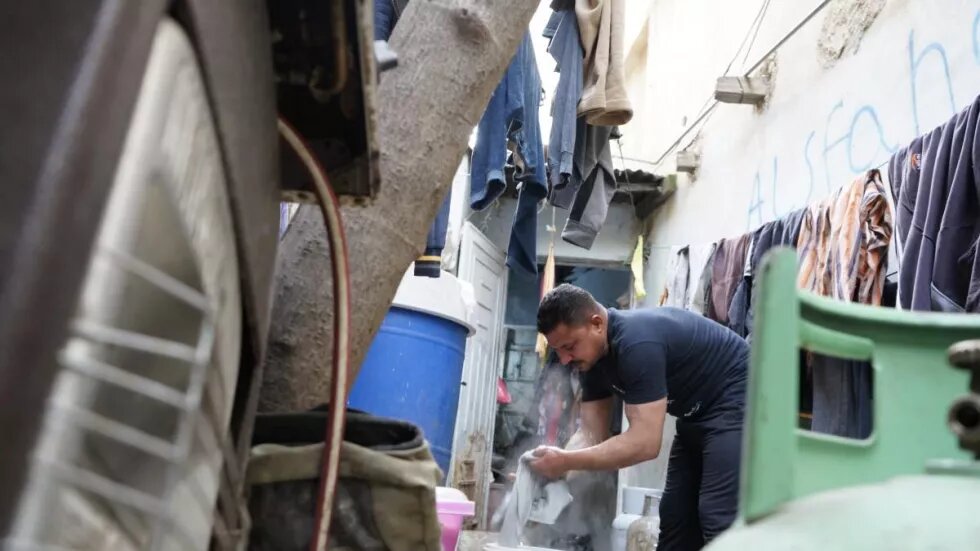

Almost every person or family in Jordan knows them, but the Jordanian government has often acted as if they don’t exist. They are the Egyptian workers. Policies are made without taking them into consideration, only to be revised much later after repeated complaints or the interference of the Egyptian government. Most multi-family apartment complexes have an Egyptian guard. The municipality sanitation workforce is almost entirely made up of Egyptian workers and most supermarkets, construction site and agricultural farms are manned by Egyptians.
At the end of 2019, the number of Egyptian nationals holding a work permit in Jordan was 223,000, according to Mohammad Al Khatib, the spokesman of Jordan’s Ministry of Labor. But most experts say that the total number of Egyptian laborers is nearly three times that. “While officially registered laborers with work permits is around 200,000, the actual number of Egyptian migrant laborers, including the informal sector, is between 700-800 Thousand” says Ahmad Awad, director of the Amman-based Phoenix Center for Economic and Informatics Studies.
The reason for the high number of informal workers is the ease of reaching Jordan. Egyptian workers travel from the nearby Arab Republic of Egypt to the Hashemite Kingdom of Jordan via a sea vessel that runs a daily route from the Red Sea town of Nuweiba to the Jordanian port of Aqaba. Egypt is the leading Arab country in population, military power and at one-time music and culture. It is the home of the Arab League, in which Jordan is a member.
Egyptian citizens are allowed into Jordan without the need for prior approval. Many enter on a tourist visa and overstay their three-month entry visa. Although Egyptians are not confined by residency laws as they are entitled to reside in Jordan whenever they want and for as long as they want with the condition that they report their place of residence, Egyptian workers are subject to security surveillance. The Jordanian government does carry out campaigns against unlicensed workers but normally these campaigns are done for internal public consumption and are usually stopped after the intervention of big brother, the Egyptian government.
While at one time Egyptian migrant workers made up as much as 68 percent of the migrant labor force in Jordan according to a 2011 study by the Tamkeen Center for Legal Aid and Human Rights (Tamkeen), the International Labor Organization (ILO) now says that registered Egyptian workers amount to a third of the migrant labor force.
Like most migrant workers, Egyptian laborers in Jordan don’t come with their families. A 2015 ILO study on the state of migrant workers in Jordan prepared by Suzan Razzaz states that the majority of migrant workers are in Jordan without their families and for a limited period of time. Among Egyptians, for example, 97 percent are in Jordan without their families. Although some migrant workers have lived in Jordan for many years, the turnover is quite high.
But Egyptian workers in Jordan were in for a big shock when the COVID-19 pandemic hit Jordan and the world. Jordanian officials reacted quickly and early by shutting off all borders on March 17th and placed the entire country under one of the strictest lockdowns globally. A four day round the clock curfew was initiated on March 21st and on weekends, the rest of the time a dusk to dawn curfew has been in place. Public and private institutions were closed, public transportation was totally halted, private cars and trucks were only allowed to doctors and essential services as well as for delivery service of drugs and food supplies.
Since the lockdown occurred in the last part of the month, many Egyptian workers found themselves penniless. In normal times, they send home most of the money they make and keep a tiny fraction. At the end of March, they found themselves without any money as many employers failed to pay them at the regular end of the month period. Banks, money changers, and courts were closed and even workers who would have preferred to return to Egypt were stuck in Jordan, unable to travel and without any money to survive.
Ahmad Awad says that since the biggest percentage of migrant workers in Jordan take informal jobs and have no permits, they depend on daily work in farming, construction, the restaurants industry, small shops and homes. “With the lockdown and curfew, they can’t reach their work they don’t get any official help and worse yet is that they are not able to return to Egypt” says Ahmad.
Hamam Isees, a reporter working for Journalists for Human Rights, visited the residence of Egyptian workers where six laborers were crammed in unhealthy conditions in the Amman neighborhood of Hashim Shamal. He reported that workers have to use the corridor to cook since they have no kitchen and have to wash their clothes by hand. “Zuheir, a 42-year-old, has been working in construction for 15 years but has been stuck without pay for over a month,” the report details. In the report published on the website Ammannet.net. Zuheir says he would like to go home but can’t. “If the borders were open, I would have gone home. I would prefer to be spending a 14-day quarantine in Egypt rather than be stuck in this tiny room.”
The Jordanian government has moved quickly to address the needs of most of its citizens but migrant laborers were not very high on the government’s priority. Linda Kalash, a lawyer and director of a migrant aid organization, says that Jordan has signed numerous international and regional treaties that guarantee equal rights to migrant workers as is provided to its citizens. According to the ILO, most Arab countries do not have unemployment benefits. As of 2019, only 5 percent of the unemployed across the Arab world qualify for some form of benefit, the ILO estimates. In Jordan, unemployment and other benefits are available to those who register with the social security institute.
While some Egyptian laborers have registered with the social security, the vast majority have not, leaving them totally exposed financially while not being able to remedy the situation.
Transportation was one of the first big problems for Egyptians. With the exception of those who live in the basements of the buildings they guard, the majority live in crowded homes far away from the location of their workplace. In the first days of the pandemic, Egyptian laborers complained that their employers forced them to sleep at the job even though it was unfit for sleeping. Those who went home had to walk for miles to reach their workplace, if it was open that is. Some Jordanians who were able to get the coveted permit ran an unregulated transportation scheme that often charged those who wanted to travel exorbitant fees.
Jordan is not known for its large companies and corporations, relying mostly on small and medium enterprises as well as on tourism. Both were badly hit with the coronavirus response.
One of the main challenges to the curfew is Jordan’s reliance on informal labor and its sizeable small and medium-sized enterprise (SME) segment. More than 52 percent of the workforce operates informally and around 95 percent of private sector businesses are SMEs, which contribute around 40 percent of GDP. The vast majority of these businesses and workers will lose their cash flow, which will make it harder for them to sustain their business and pay their bills. SMEs might have to lay off many of their workers to cut costs. Day laborers in the construction and agriculture sectors, who are often foreign workers and ineligible for social services, will also lose their source of income, and hence, their ability to meet their daily needs.
Within the context of SMEs and the informal sector, the Middle East Institute quoted Dr. Allison Hartnett, a political economist and Jordan scholar at Yale University, as referencing the size and abilities of Jordanian companies. “Since most Jordanian companies are micro or small enterprises and we know that firm informality is high, then firm owners aren't liable to get much government support, either because they're informal and thus illegible to the state or because they are too small to survive a lack of revenue for very long.”
Another major sector to have suffered during the lockdown has been tourism, even though Jordan was on record to having a very good year in term of revenue from this sector that also brings in foreign currency to the country. All tourism activities in Jordan have ceased. This comes at an especially bad time as the sector had been gaining momentum in the last few years, with expenditures growing by 10 percent last year. Tourism accounted for 12.5 percent of GDP in 2018, employed more than 42,000 workers directly and 130,000 indirectly, and has also made a significant contribution to Jordan’s foreign currency reserves. Jawad Abbasi, a Jordanian business analyst, told Laith Al-Ajlouni, who did a report for Middle East Institute, that most of the country’s tourism expenditures, which totaled 4 billion dinars ($5.6bn) in 2019, were in foreign currency.
After six weeks into the lockdown and due to the low level of coronavirus infections, the Jordanian government began easing the lockdown, allowing some companies to reopen with strict health restrictions. Banks and money changers were also allowed to open, providing a chance for Egyptian workers to make the difficult request of their families to send them money rather than the other way around. Ironically, as jobs opportunities returned the Jordanian government announced that it will look into allowing migrant workers wishing to return home to do so. The Jordanian government agreed to waive all labor-related fines and fees for expat workers wanting to return to their home countries, Jordanian media has reported. Jordan’s Labor minister, Nidal Bataineh, has called on migrant workers to apply through Hemayah.jo, an online platform that coordinates their repatriation amid the coronavirus outbreak. The application deadline is May 4. Bataineh added that fines and fees related to work permits will be waived, even for illegal migrant workers in the country.